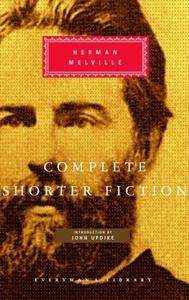The Complete Shorter Fiction

Editorial Everyman's Library
Fecha de edición octubre 1997
Idioma inglés
EAN 9781857152326
478 páginas
Libro
encuadernado en tapa dura
Resumen del libro
Herman Melville (1819-91) brought as much genius to the smaller-scale literary forms as he did to the full-blown novel: his poems and the short stories and novellas collected in this volume reveal a deftness and a delicacy of touch that is in some ways even more impressive than the massive, tectonic passions of Moby-Dick. In a story like "Bartleby, the Scrivener" -- one of the very few perfect representatives of the form in the English language -- he displayed an unflinching precision and insight and empathy in his depiction of the drastically alienated inner life of the title character. In "Benito Cereno," he addressed the great racial dilemmas of the nineteenth century with a profound, almost surreal imaginative clarity. And in Billy, Budd, Sailor, the masterpiece of his last years, he fused the knowledge and craft gained from a lifetime's magnificent work into a pure, stark, flawlessly composed tale of innocence betrayed and destroyed. Melville is justly honored for the epic sweep of his mind, but his lyricism, his skill in rendering the minute, the particular, the local, was equally sublime.
Biografía del autor
Herman Melville nació en Nueva York en 1819. Acuciado por la temprana muerte de su padre y la situación de su familia, desempeñó diversos oficios, entre ellos el de maestro y el de marinero a bordo de varios barcos por el Atlántico, el Pacífico y los mares del Sur. Finalmente se estableció en tierra firme en 1847. Acabó sus días en 1891 sumido en el olvido y en la precariedad económica.








